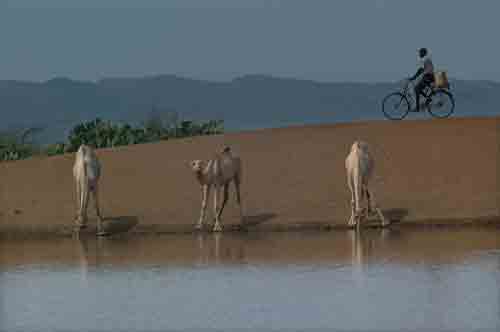Several UW researchers are working on disease prediction and control by looking at the interrelationships of people, other living creatures and their habitats.
“Human-animal medicine explores the unprecedented convergence of human, animal, and environmental health in an increasingly crowded and interdependent world,” said Dr. Peter Rabinowitz of the UW School of Public Health. “Recent global pandemics such as SARS and influenza H1N1 require that we look at new paradigms for healthy coexistence.”
Rabinowitz of the Department of Environmental and Occupational Health Sciences and the Department of Global Health, recently arrived from Yale University. He directs the UW Animal-Human Medicine Project.
He and Dr. Ali Mokdad of the Department of Global Health and the Institute for Health Metrics and Evaluation will lead separate studies in what is called One Health, which integrates veterinary, ecological and medical sciences. Projects headed by Rabinowitz and Mokidad were two of the 81 proposals worldwide to be awarded Grand Challenges in Global Health Exploration Round 11 Grants from the Bill & Melinda Gates Foundation this week.
Rabinowitz’s team will investigate whether intestine-cohabitating microorganisms shared between livestock and children might be a key to correcting malnutrition in developing nations.
Malnutrition causes nearly half of the deaths in children under 5 worldwide. The global burden of this disease is shouldered predominately in Africa and Southeast Asia and is difficult to alleviate.
In Kenya, East Africa, the researchers will to see whether children living in close proximity to domestic animals harbor gut microbes that can affect nutritional status.
If this is the case, the researchers say, it’s possible that resetting the gut microbiome in livestock can be a sustainable intervention to improve children’s health and development. Gut microbiome refers collectively to the tiny organisms residing and interacting in the lower digestive tract.
Rabinowitz and his colleagues at the UW, Washington State University, and Centers for Disease Control Kenya will conduct the research in an area of western Kenya w here more than 90 percent of the households own livestock.
“Disturbance in the balance of bacterial communities in the intestines can make it hard for children to absorb nutrition and grow and develop normally,” Rabinowitz said. “When humans and animals live closely together, there may be sharing of these microbial communities. As we work to improve childhood nutrition globally it is important to explore these relationships.”
Also involved in the project are Dr. Judd Walson of the UW Department of Global Health; Dr. Wes Van Voorhis of the Division of Allergy and Infectious Diseases in the UW Department of Medicine; Dr. Guy Palmer of the Paul G. Allen School for Global Animal Health at Washington State University and a UW affiliate associate professor of global health; and Dr. Joel Montgomery of the Centers for Disease Control-Kenya.
In a different project in Zambia, metrics specialist Mokdad and his team will amalgamate data on animals, the environment and people to measure their overall impact on human disease and mortality. This is the first attempt to integrate such data, which will include temperature and rainfall, and the physical condition and sales of animals and crops. The team hopes to generate an enhanced human health metric that incorporates the effects of animal health. They also plan to recommend improvements in data collection. They call the project “One Metric for One Health: A New Approach.”
Grand Challenges Explorations funds individuals worldwide to explore ideas that can break the mold in solving persistent global health and development challenges. Successful projects have the opportunity to receive future support up to $1 million.


